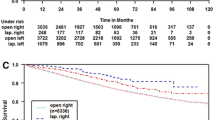Abstract
Purpose
This study was designed to assess whether the exclusion criteria used in the Clinical Outcomes of Surgical Therapy and Colon Cancer Laparoscopic or Open Resection trials affected the generalizability of their findings.
Methods
A prospective database of consecutive laparoscopic resections performed for colon cancer was reviewed. Patients were categorized into two groups: inclusion group and exclusion group, based on the selection criteria used in the Clinical Outcomes of Surgical Therapy and Colon Cancer Laparoscopic or Open Resection trials. Baseline and perioperative data were analyzed by using t-tests, Wilcoxon’s rank-sum, chi-squared, and Fisher’s exact test. Kaplan-Meier survival curves, followed by adjustment for tumor nodes metastasis stage and age utilizing a Cox proportional hazard model, were performed.
Results
The inclusion group had 221 patients and the exclusion group had 166 (median age and gender distribution were similar). The exclusion group had a higher conversion rate (23 vs. 11.3 percent; P = 0.0023). There was no difference in intraoperative complications (9 percent for exclusion group vs. 8.6 percent for inclusion group; P = 0.8), operative time (180 minutes for exclusion group vs.172 minutes for inclusion group; P = 0.24), or postoperative complication rates (33.7 percent for exclusion group vs. 26 percent for inclusion group; P = 0.13). No difference was detected in perioperative mortality rates, length of stay, days to diet as tolerated, and adjusted two-year survival.
Conclusions
No differences were found in outcomes between the two groups in terms of operative/postoperative complications, length of stay, perioperative mortality, and two-year survival. It seems that all patients with colon cancer can potentially benefit from a laparoscopic approach.



Similar content being viewed by others
References
Jacobs M, Verdeja JC, Goldstein HS. Minimally invasive colon resection (laparoscopic colectomy). Surg Laparosc Endosc 1991;1:144–50.
Fowler DL, White SA. Laparoscopy-assisted sigmoid resection. Surg Laparosc Endosc 1991;1:183–8.
Brune IB, Schonleben K. Laparoscopic sigmoid resection. Chirurg 1992;63:342–4.
Khalife ME. Right and left laparoscopic colectomy. Apropos of 10 cases. Chirurgie 1992;118:538–40.
Flanders HD, Usher CH 3rd. Laparoscopically assisted colectomy. Surg Laparosc Endosc 1993;3:81–7.
Rosell Pradas J, Astruc Hoffmann A, Ruiz de Adana A, Vara Thorbeck R. Minimally aggressive surgery in advanced cancer of the colon. Rev Esp Enferm Dig 1993;83:429–33.
Alexander RJ, Jaques BC, Mitchell KG. Laparoscopically assisted colectomy and wound recurrence. Lancet 1993;341:249–50.
Wexner SD, Cohen SM. Port site metastases after laparoscopic colorectal surgery for cure of malignancy. Br J Surg 1995;82:295–8.
Leung KL, Yiu RY, Lai PB, Lee JF, Thung KH, Lau WY. Laparoscopic-assisted resection of colorectal carcinoma: five-year audit. Dis Colon Rectum 1999;42:332–3.
Milsom JW, Bohm B, Hammerhofer KA, Fazio V, Steiger E, Elson P. A prospective, randomized trial comparing laparoscopic versus conventional techniques in colorectal cancer surgery: a preliminary report. J Am Coll Surg 1998;187:46–55.
Reilly WT, Nelson H, Schroeder G, Wieand HS, Bolton J, OConnell MJ. Wound recurrence following conventional treatment of colorectal cancer: a rare but perhaps underestimated problem. Dis Colon Rectum 1996;39:200–7.
Vukasin P, Ortega AE, Greene FL, et al. Wound recurrence following laparoscopic colon cancer resection. Results of The American Society of Colon and Rectal Surgeons Laparoscopic Registry. Dis Colon Rectum 1996;39:S20–3.
Schiedeck TH, Schwander O, Baca I, et al. Laparoscopic surgery for the cure of colorectal cancer: results of a German five-center study. Dis Colon Rectum 2000;43:1–8.
Clinical Outcomes of Surgical Therapy Study Group. A comparison of laparoscopically assisted and open colectomy for colon cancer. N Engl J Med 2004;350:2050–9.
Lacy AM, Garcia-Valdecasas JC, Delgado S, et al. Laparoscopy-assisted colectomy versus open colectomy for treatment of non-metastatic colon cancer: a randomised trial. Lancet 2002;359:2224–9.
Veldkamp R, Kuhry E, Hop WC, et al. Colon Cancer Laparoscopic or Open Resection Study Group (COLOR). Laparoscopic surgery versus open surgery for colon cancer: short-term outcomes of a randomised trial. Lancet Oncol 2005;6:477–84.
Author information
Authors and Affiliations
Corresponding author
Additional information
Read at the meeting of The American Society of Colon and Rectal Surgeons, St. Louis, Missouri, June 2 to 6, 2007.
About this article
Cite this article
Moloo, H., Sabri, E., Wassif, E. et al. Laparoscopic Resection for Colon Cancer: Would all Patients Benefit?. Dis Colon Rectum 51, 173–180 (2008). https://doi.org/10.1007/s10350-007-9132-0
Received:
Revised:
Accepted:
Published:
Issue Date:
DOI: https://doi.org/10.1007/s10350-007-9132-0




